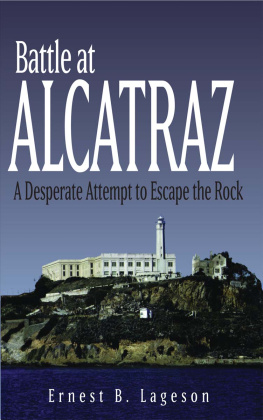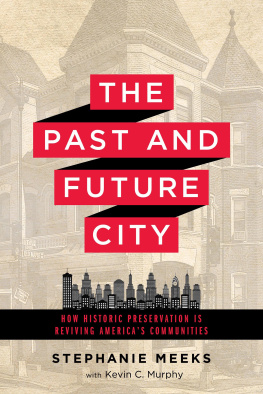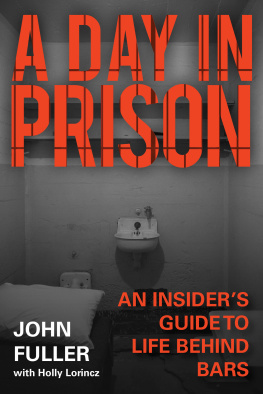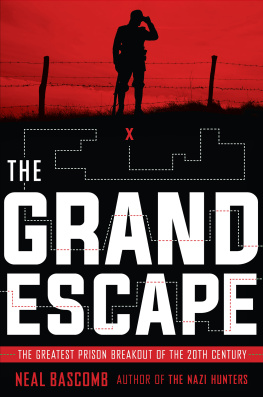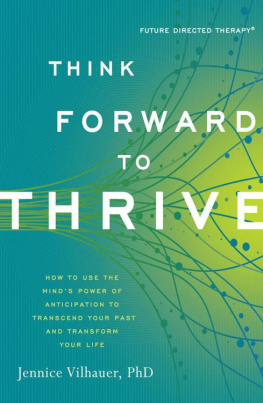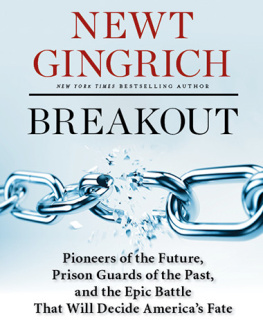BREAKOUT
BREAKOUT
PIONEERS OF THE FUTURE,
PRISON GUARDS OF THE PAST,
AND THE EPIC BATTLE
THAT WILL DECIDE AMERICAS FATE
NEWT GINGRICH
WITH ROSS WORTHINGTON

An Eagle Publishing Company Washington, DC
Copyright 2013 by Newt Gingrich
All rights reserved. No part of this publication may be reproduced or transmitted in any form or by any means electronic or mechanical, including photocopy, recording, or any information storage and retrieval system now known or to be invented, without permission in writing from the publisher, except by a reviewer who wishes to quote brief passages in connection with a review written for inclusion in a magazine, newspaper, website, or broadcast.
First ebook edition 2013
eISBN 978-1-62157-022-6
The Library of Congress has cataloged the hardcover edition as follows:
Published in the United States by
Regnery Publishing, Inc.
One Massachusetts Avenue NW
Washington, DC 20001
www.Regnery.com
10 9 8 7 6 5 4 3 2 1
Books are available in quantity for promotional or premium use. Write to Director of Special Sales, Regnery Publishing, Inc., One Massachusetts Avenue NW, Washington, DC 20001, for information on discounts and terms, or call (202) 216-0600.
Distributed to the trade by
Perseus Distribution
250 West 57th Street
New York, NY 10107
To the pioneers of the future, who create so many better opportunities for all Americans.
CONTENTS
E ven before the painful sore appeared in her mouth just before Christmas in 1999, Abigail Burroughs was an exceptional young woman. She had earned awards for her community service in her hometown of Falls Church, Virginia, and had volunteered in homeless shelters. She had graduated second in her high school class, and now she was excelling in an honors program at the University of Virginia.
Of all the reasons we might have read about Abigail in the Washington Post, a desperate battle with bureaucracy over access to a lifesaving drug would have seemed the least likely. It was a cruel battle she shouldnt have had to fight.
It was annoying, Abigail told the Cavalier Daily, her college newspaper, referring to the sore in her mouth. I just wanted it to go away. She finally convinced her doctor to remove it. Before classes resumed after winter break, Abigail heard from the doctor. The lab results were shocking: the sore was cancerous. She was nineteen years old.
Still, Abigails prognosis was good once the surrounding tissues were removed. Her doctor told her there was a 90-percent chance the cancer wouldnt come back. The short procedure should have been the end of the matter.
But it wasnt. The cancer returned a few months later, this time as a larger lump in her neck. She had it removed surgically and quickly began radiation and chemotherapy, which left severe burns on the inside of her mouth. But Abigail was optimistic she would recover and return to school, where she had a boyfriend and lived in an apartment with other girls her age.
Not long after the first round of treatment, though, her doctors found another lump in her neck. They discovered the cancer had spread to her lungs and stomach too. The doctors in Charlottesville had nothing else to try. But doctors at Johns Hopkins, one of the leading cancer centers in the country, knew about two breakthrough drugs that showed promise for cases like Abigails. They were her best chance, the doctors said.
Unfortunately, neither drug was approved by the Food and Drug Administration, the federal agency that must clear virtually every medical product for safety and effectiveness. Both drugs had passed the early stages of trials, indicating that they were safe for use in patients. But it would take many yearsand hundreds of millions of dollarsfor the companies behind them to prove to the FDAs highest standards of scientific evidence what some of the best doctors in the field had already observed: these drugs could help cancer patients who had failed to respond to the traditional treatments. Abigail Burroughs didnt have years to wait for definitive evidence while the FDA haggled with the drugmakers. She was dying. She needed the breakthrough treatments immediately.
Abigails doctors tried to enroll her in the clinical trials the companies were conducting to obtain FDA approval. Either of these would have given her a chance of getting the real treatmentor of getting a placebo (which of course meant certain death). But Abigails condition didnt meet the exacting standards for even this undesirable choice.
The FDA offers just one recourse for patients who urgently need access to breakthrough drugs if they dont make the clinical trials. Patients can ask the drugmakers for compassionate use, which, if granted, must be approved by FDA bureaucrats on a case-by-case basis.
At this point Abigails story began to get national attention. It started at the University of Virginia, where the administration, fraternities, and student groups organized a campaign to petition the companies to give Abigail the drugs. Then the campaign spread. Thousands of people she had never met began writing to the drug companies on her behalf.
At the same time, her father founded the Abigail Alliance for Better Access to Developmental Drugs to push for wider access to new drugs for terminally ill patients who had no other options. He argued that it is unjustifiable to keep the drugs from dying patients, even if they carry risks.
A reporter from the Washington Post visited Abigail in her apartment and published a heartbreaking story on her struggle. He reported that the college junior rates her life by what she can doa daily visit to her favorite Starbucksor how far she can walkshe slept 24 hours to gather strength to make it to a Dave Matthews concert last month.
Despite months of public pressure on Abigails behalf, the companies refused to give her the drugs. It seemed that in the middle of their billion-dollar effort to win FDA approval, they were unwilling to risk a bright twenty-one-year-old girls dying while receiving the treatment that was under scrutiny. For Abigail, it would be the FDA-sanctioned treatments, or nothing at all.
I try not to think about [the companies], because when I start to, it makes me really, really angry, she told the Post. I cant understand how these people can be so nonchalantly by-the-book and just say no.
Abigail passed away about a month later. Her father carried his quest for more open access all the way to the Supreme Court, which declined to hear his challenge to the existing system. His suit attempted to make available one of the drugs to which Abigail had sought access, C225, known today as Erbitux.
Researchers invented Erbitux in 1983, when Abigail was three years old.
By the time Abigail asked for Erbitux in 2001, eighteen years after its invention, it had already shown promising results. Yet it did not receive FDA approval for three more years, and then only for colorectal cancer. It took until 2006 to win approval for localized head and neck cancer. The drug was not approved for late-stage head and neck cancer like Abigails until 2011, ten years after her death, eighteen years after a drug company acquired the rights, and twenty-eight years after it was invented.
Abigails story is tragic, but it is the norm. Somebody was willing to lock her in the past, denying her the breakthrough drug of tomorrow that might have saved her life. And as you will read here, the forces fighting to keep the Past upon its throne are not limited to medicine. They are at work in many important fields.
This is what we must change.
A merica is on the edge of a breakout.
Next page




